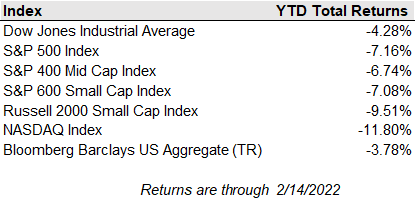Stocks fell last Friday as rising fears of a Russian invasion of Ukraine added to a spike in near-term inflation concerns and weaker consumer sentiment. U.S. National Security Advisor Jake Sullivan warned at a Friday afternoon White House briefing that a Russian invasion could take place during the Olympics, sending Treasury yields falling, oil prices popping and the S&P 500 falling below its 200-day moving average. The week’s volatility in the bond market started after hotter than expected inflation data, which scared investors and prompted St. Louis Fed President James Bullard to call for accelerating rate hikes. For the week, the Dow Jones average fell 1%, the S&P 500 shed 1.8% and the Nasdaq Composite retreated 2.2%.
Historically, wars have little long-term effect on market movements. Shock events, like the Russian invasion of Ukraine, average a 5% total drawdown in the S&P 500 with an average recovery time of 47 days. It is worth noting that the Pearl Harbor Bombing and 9/11 are included in this data set which skew the data towards larger drawdowns and longer recovery times. Investors should be eyeing inflation data and corporate earnings to determine a market judgement.
The economic calendar this week features updates on producer prices, retail sales, housing starts and existing home sales. Chicago Federal Reserve Bank President Charles Evans, New York Federal Reserve Bank President John Williams, St. Louis Federal Reserve Bank President James Bullard, and Cleveland Federal Reserve Bank President Loretta Mester will all be giving speeches this week.


